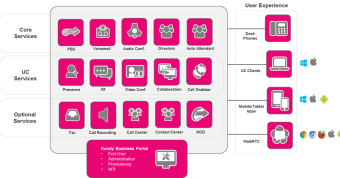Reflections on Futurecom from a First Timer
One of the perks of working for a company that supplies solutions for communications companies operating in all four corners of the world is the occasional opportunity to do some globetrotting. The 2012 version of Futurecom, held in Rio de Janeiro the second week of October, presented me with such an occasion.
GENBAND, already with a sizeable footprint in the Central America Latin America (CALA) region, is looking to expand its presence among an expansive group of communications companies serving consumers and businesses in some of the fastest growing economies in the world. Futurecom attendance is mandatory for any solutions provider with serious ambitions south of the equator.
As part of the GENBAND workforce at the conference and exhibition, and first time visitor to South America, I got a sort of “innocence abroad” immersion into the host city of the 2014 World Cup and 2016 Olympics, as well as an introduction to the largest telecom tradeshow in Latin America.
For the benefit of those not fortunate enough to have made it to Rio this year, here’s a quick recap – half travelogue, half trade show review – of the Futurecom 2012 experience:
Fare Thee Well: Taxi fares, relative to those in other large cities, are not unreasonable in Rio. But because you’re going to spend so much time in a taxi – commuting to the convention center or anywhere else in a city with such a dense population and choked traffic arteries – be prepared to dedicate a good percentage of your travel budget to local transportation.
 Smooth as Silk: Once you managed to reach the Rio Centro Exhibition and Convention Center, the venue for Futurecom, you entered a study in organizational excellence. Though the show does not attract the tens of thousands that descend on Barcelona for Mobile World Congress (MWC) each February, there were enough visitors to make for some long lines if not for the show organizers’ dedicating the proper resources for registration, food services, the conference program and other services. For the first time in 20 years of attending trade shows, I misplaced my registration badge. No problema. I had a replacement in less than five minutes.
Smooth as Silk: Once you managed to reach the Rio Centro Exhibition and Convention Center, the venue for Futurecom, you entered a study in organizational excellence. Though the show does not attract the tens of thousands that descend on Barcelona for Mobile World Congress (MWC) each February, there were enough visitors to make for some long lines if not for the show organizers’ dedicating the proper resources for registration, food services, the conference program and other services. For the first time in 20 years of attending trade shows, I misplaced my registration badge. No problema. I had a replacement in less than five minutes.
Not MWC: Futurecom is sometimes referred to as the MWC of Latin America. There’s almost no accuracy to that assessment. Besides only being a fraction of the size in comparison to MWC, Futurecom is not a global conference. It is dedicated to the telecommunications industry of Latin America and specifically Brazil. The South American centricity of the exhibition permeated the conference. The press, mostly Portuguese and Spanish speaking, for example, were laser-focused on what exhibitors were doing in Latin America and especially interested in the role they would play in readying Rio’s infrastructure to handle demands related to the upcoming World Cup and Summer Olympics. There’s definitely an opportunity for vendors to assist Brazil in the upgrading of its infrastructure, both from a physical network perspective, as well as the end-user experience.
Say Again: Most English-only speaking travelers, such as myself, arrogantly take for granted that a good percentage of inhabitants of large international cities, especially those working in the services industry, are multilingual, with English being one of those other tongues. That doesn’t seem to be the case in Brazil, where a very small percentage of hotel workers, taxi drivers and conference workers that I encountered spoke English. The show itself was conducted in Portuguese, with opening ceremonies, keynotes and conference speakers primarily speaking in Portuguese. Again, as an English-only attendee, much of the conference section of the show was inaccessible, though translation services were available. But then again, this is a show dedicated to the Latin American market and it only makes sense that business be conducted in the language of that region.
All in All: Despite a few logistical issues, Futurecom 2012 was a worthwhile experience, both culturally and from a business perspective. With the possible exception of Asia Pacific, the Latin American market is the fastest growing region in the world, buoyed by an expanding middle class with as strong a participation in the Connected Age we live in as can be found anywhere. To tap into this vibrant and expanding market, Futurecom attendance is a must.
From a travelogue perspective, Rio is one of the most beautiful destinations in the world. Despite my language barrier, the people I encountered were thoughtful, friendly and very proud of their city, country and region.
But most importantly, this intrepid traveler has finally acquired empirical evidence that my fifth grade science teacher wasn’t fibbing about one of the great mysteries of southern latitudes, at least to a 12 year old: it’s true, water does descend the drain in a counter-clockwise path.




